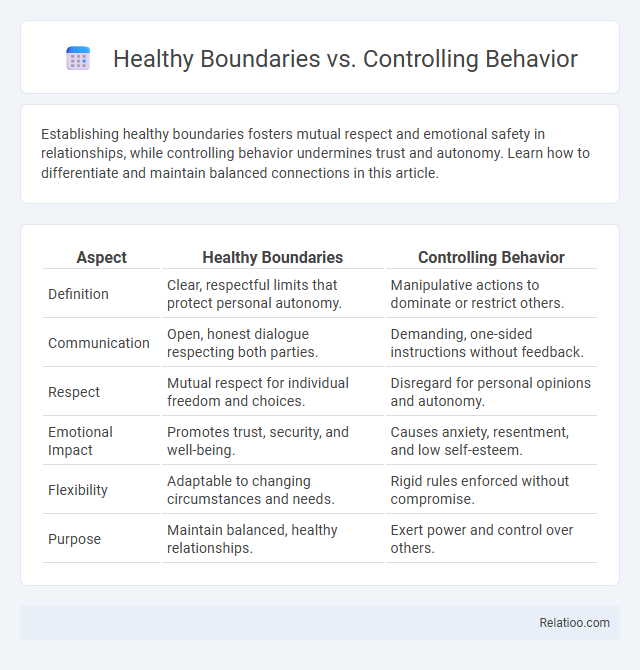Establishing healthy boundaries fosters mutual respect and emotional safety in relationships, while controlling behavior undermines trust and autonomy. Learn how to differentiate and maintain balanced connections in this article.
Table of Comparison
| Aspect | Healthy Boundaries | Controlling Behavior |
|---|---|---|
| Definition | Clear, respectful limits that protect personal autonomy. | Manipulative actions to dominate or restrict others. |
| Communication | Open, honest dialogue respecting both parties. | Demanding, one-sided instructions without feedback. |
| Respect | Mutual respect for individual freedom and choices. | Disregard for personal opinions and autonomy. |
| Emotional Impact | Promotes trust, security, and well-being. | Causes anxiety, resentment, and low self-esteem. |
| Flexibility | Adaptable to changing circumstances and needs. | Rigid rules enforced without compromise. |
| Purpose | Maintain balanced, healthy relationships. | Exert power and control over others. |
Understanding Healthy Boundaries
Healthy boundaries are essential for maintaining respect, trust, and autonomy in relationships by clearly defining personal limits and expectations without infringing on others' rights. Unlike controlling behavior or control, which involve dominating or manipulating others to meet one's own needs, healthy boundaries promote mutual understanding and balance. Establishing and communicating healthy boundaries fosters emotional well-being and prevents unhealthy power dynamics.
Defining Controlling Behavior
Controlling behavior involves attempts to dominate or manipulate others by enforcing strict rules, limiting autonomy, and overriding personal decisions, often leading to emotional or psychological harm. Unlike healthy boundaries, which promote mutual respect and personal space, controlling behavior prioritizes the controller's needs and power at the expense of others' well-being. Understanding this distinction is crucial for recognizing toxic dynamics and fostering balanced, respectful relationships.
Key Differences Between Boundaries and Control
Healthy boundaries protect your emotional and physical well-being by clearly defining what is acceptable in relationships, promoting respect and autonomy. Controlling behavior seeks to dominate or manipulate others, often disregarding their feelings and freedom, which undermines trust and equality. The key difference lies in boundaries fostering mutual respect and self-care, while control enforces submission and dependency.
Signs of Healthy Boundary Setting
Recognizing signs of healthy boundary setting involves clear communication of your needs and limits without guilt or intimidation, fostering mutual respect in relationships. Unlike controlling behavior or control, healthy boundaries empower you to maintain autonomy while encouraging others to honor your personal space and emotional well-being. Respecting these boundaries prevents manipulation and promotes balanced interactions based on trust and understanding.
Red Flags of Controlling Behavior
Controlling behavior often appears as red flags such as persistent monitoring of a partner's actions, restricting their social interactions, or demanding constant obedience, which undermines trust and autonomy. Unlike healthy boundaries that respect individual freedom and promote mutual respect, controlling behavior enforces dominance and limits personal growth. Recognizing these red flags early is crucial for maintaining a balanced, respectful relationship and preventing emotional abuse.
Impact on Relationships: Boundaries vs Control
Healthy boundaries foster mutual respect, trust, and clear communication, promoting balanced and supportive relationships, while controlling behavior undermines autonomy and creates tension by imposing restrictions and demands. Boundaries allow individuals to express needs and limits without fear of judgment, leading to emotional safety and deeper connections. In contrast, control erodes trust, breeds resentment, and diminishes intimacy by prioritizing power over partnership.
Why Boundaries Foster Respect and Growth
Healthy boundaries establish clear limits that protect your well-being and promote mutual respect in relationships. Unlike controlling behavior or control, which seek to dominate or manipulate, boundaries encourage personal growth by allowing individuals to make autonomous choices. Setting and respecting these boundaries fosters trust and a balanced dynamic, essential for emotional health and positive connections.
The Emotional Toll of Being Controlled
The emotional toll of being controlled manifests as chronic stress, anxiety, and diminished self-esteem due to persistent manipulation and lack of autonomy. Healthy boundaries promote respect and personal agency, contrasting sharply with controlling behavior that undermines individual freedom. Recognizing the difference between firm boundaries and oppressive control is crucial for emotional well-being and mental health.
Strategies for Setting Healthy Boundaries
Setting healthy boundaries involves clear communication of personal limits, prioritizing self-respect, and recognizing emotional needs without imposing restrictions on others. Effective strategies include assertive expression of feelings, consistent reinforcement of limits, and differentiating between influence and control to avoid manipulative dynamics. Cultivating mutual respect and trust ensures boundaries promote autonomy rather than enforcing controlling behavior or authoritarian control tactics.
Seeking Help: Breaking Free from Controlling Dynamics
Recognizing the differences between healthy boundaries, controlling behavior, and control is essential for seeking help and breaking free from oppressive dynamics. Healthy boundaries respect your autonomy and promote mutual trust, while controlling behavior infringes on your freedom and emotional well-being. You can regain empowerment by reaching out to professional support systems, such as therapists or support groups, specializing in healthy relationship dynamics.

Infographic: Healthy Boundaries vs Controlling Behavior
 relatioo.com
relatioo.com